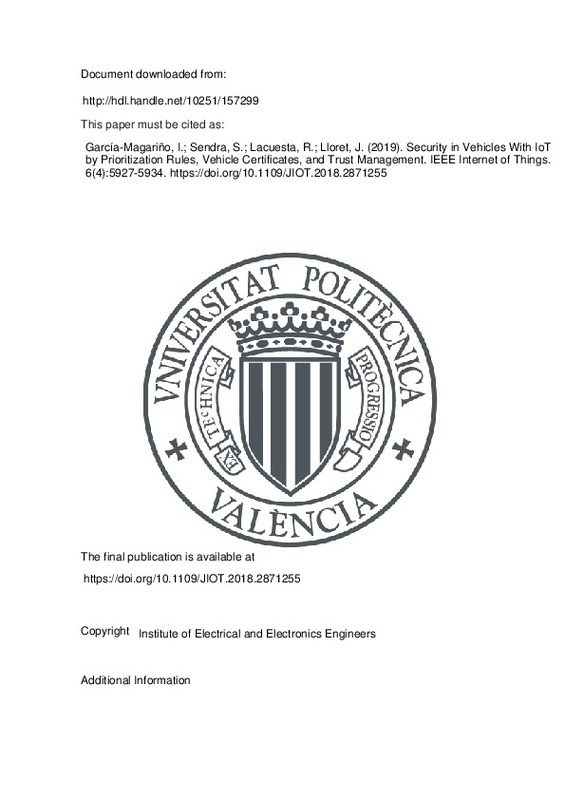García-Magariño, I.; Sendra, S.; Lacuesta, R.; Lloret, J. (2019). Security in Vehicles With IoT by Prioritization Rules, Vehicle Certificates, and Trust Management. IEEE Internet of Things. 6(4):5927-5934. https://doi.org/10.1109/JIOT.2018.2871255
Por favor, use este identificador para citar o enlazar este ítem: http://hdl.handle.net/10251/157299
|
Título:
|
Security in Vehicles With IoT by Prioritization Rules, Vehicle Certificates, and Trust Management
|
|
Autor:
|
García-Magariño, Iván

 Sendra, Sandra
Lacuesta, Raquel
Sendra, Sandra
Lacuesta, Raquel

 Lloret, Jaime
Lloret, Jaime
|
|
Entidad UPV:
|
Universitat Politècnica de València. Departamento de Comunicaciones - Departament de Comunicacions
|
|
Fecha difusión:
|
|
|
Resumen:
|
[EN] The Internet of Vehicles (IoV) provides new opportunities for the coordination of vehicles for enhancing safety and transportation performance. Vehicles can be coordinated for avoiding collisions by communicating their ...[+]
[EN] The Internet of Vehicles (IoV) provides new opportunities for the coordination of vehicles for enhancing safety and transportation performance. Vehicles can be coordinated for avoiding collisions by communicating their positions when near to each other, in which the information flow is indexed by their geographical positions or the ones in road maps. Vehicles can also be coordinated to ameliorate traffic jams by sharing their locations and destinations. Vehicles can apply optimization algorithms to reduce the overuse of certain streets without excessively enlarging the paths. In this way, traveling time can be reduced. However, IoV also brings security challenges, such as keeping safe from virtual hijacking. In particular, vehicles should detect and isolate the hijacked vehicles ignoring their communications. The current work presents a technique for enhancing security by applying certain prioritization rules, using digital certificates, and applying trust and reputation policies for detecting hijacked vehicles. We tested the proposed approach with a novel agent-based simulator about security in Internet of Things (IoT) for vehicle-to-vehicle communications. The experiments focused on the scenario of avoidance of collisions with hijacked vehicles misinforming other vehicles. The results showed that the current approach increased the average speed of vehicles with a 64.2% when these are giving way to other vehicles in a crossing by means of IoT.
[-]
|
|
Palabras clave:
|
Agent-based simulation (ABS)
,
Coordination
,
Intelligent transportation
,
Reputation
,
Security
,
Trust
|
|
Derechos de uso:
|
Reserva de todos los derechos
|
|
Fuente:
|
IEEE Internet of Things. (eissn:
2327-4662
)
|
|
DOI:
|
10.1109/JIOT.2018.2871255
|
|
Editorial:
|
Institute of Electrical and Electronics Engineers
|
|
Versión del editor:
|
https://doi.org/10.1109/JIOT.2018.2871255
|
|
Código del Proyecto:
|
info:eu-repo/grantAgreement/UNIZAR//JIUZ-2017-TEC-03/
info:eu-repo/grantAgreement/CAI//IT1%2F18/
info:eu-repo/grantAgreement/Harvard University//T49_17R/
info:eu-repo/grantAgreement/AEI/Plan Estatal de Investigación Científica y Técnica y de Innovación 2013-2016/TIN2017-84802-C2-1-P/ES/RED COGNITIVA DEFINIDA POR SOFTWARE PARA OPTIMIZAR Y SECURIZAR TRAFICO DE INTERNET DE LAS COSAS CON INFORMACION CRITICA/
|
|
Agradecimientos:
|
This work was supported by Harvard University (stay funded by T49_17R), University of Zaragoza (JIUZ-2017-TEC-03), Foundation Bancaria Ibercaja, Foundation CAI (IT1/18), University Foundation Antonio Gargallo (call 2017), ...[+]
This work was supported by Harvard University (stay funded by T49_17R), University of Zaragoza (JIUZ-2017-TEC-03), Foundation Bancaria Ibercaja, Foundation CAI (IT1/18), University Foundation Antonio Gargallo (call 2017), and "Ministerio de Economia y Competitividad" in the "Programa Estatal de Fomento de la Investigacion Cientifica y Tecnica de Excelencia, Subprograma Estatal de Generacion de Conocimiento" (TIN2017-84802-C2-1-P).
[-]
|
|
Tipo:
|
Artículo
|







![[Cerrado]](/themes/UPV/images/candado.png)


